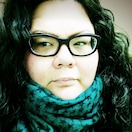In the days leading up to the Juno Awards in Vancouver this past March, local hip-hop artist JB the First Lady, a.k.a. Jerilyn Webster, spent some time with CBC Music and also invited our cameras to her JunoFest showcase event for this short profile about Indigeneity, identity, music and the power of hip-hop.
“As an Indigenous young woman, saying where I come from is so powerful, because at one time, we weren’t allowed to say where we come from or speak our language,” Webster says in the video. “When I came to Vancouver, I didn’t have a sense of identity or belonging because of the racism and the stereotypes. My mom always told me to go to the Friendship Centre where the Native community was, and there were young people who were part of a movement and it turned into music.”
Onstage in the video, the Nuxalk and Onondaga Nations rapper, activist and mother talks about embracing her sexual wellness as an Indigenous woman, and reproduction as a means of resistance. She also advocates passionately for justice for Tina Fontaine, clean water and missing and murdered Indigenous women and girls.
This activism is the foundation of her songwriting, too, and is particularly evident on her 2017 record, Meant to Be. Webster credits hip-hop with helping her cultivate her voice.
“Hip-hop elements have been a direct conduit into my own culture and practising my own culture,” Webster says in the video. “Today I can make my own regalia, I’ve made my own cedar hat, I dance in powwow, I dance in our potlatch ceremonies, and it was because of hip-hop.”
More to explore:
JB the First Lady: a candid interview about hip-hop, Indigenous identity and finding her voice
Here’s how to get your Indigenous language and music heard on CBC’s Reclaimed
Meet Melody McKiver, the Anishinaabe musician changing the way we think about the viola

